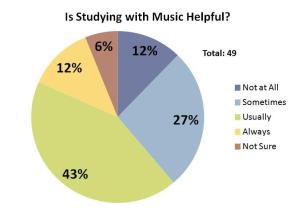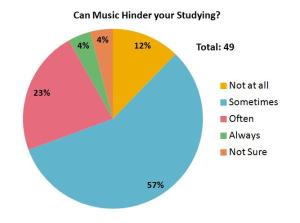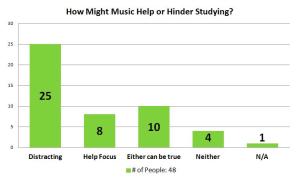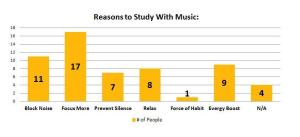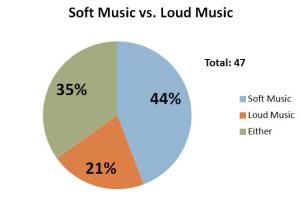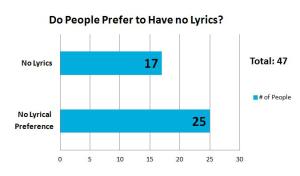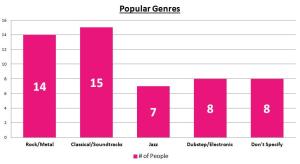
brains! (Photo credit: cloois)
The human brain is in many ways like the super computer that keeps us alive. It runs all of our organs, lets us control our bodies, and of course gives us the ability to think. With new research conducted all the time, it seems our brains are far more powerful than we had ever previously imagined. It is not a static organ, but rather it is dynamic, always changing and always adapting. This is why it is so interesting to see how much music plays a part in affecting how our brain functions. This project was designed to explore the full extent of music’s impact on a person’s ability to study, both in positive and negative ways. This was done with traditional research methods, an electronic survey conducted on fellow students, through interviews with an enthusiastic student, and with interviews from knowledgeable James Madison biology professors. What was found from this research was an array of different ways music does affect both the brain and studying. These findings go into the different areas of the brain affected by music and studying, the properties of music most relevant to the brain’s functioning, the neurotransmitter’s effect on mood, the different neural properties that influence memory encoding, the differences in types of studying and learning, and people’s personal preferences when it comes to musical choice.
Survey
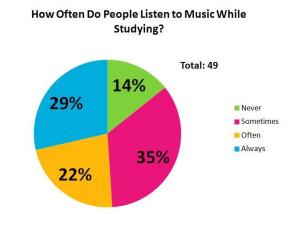
Photo Credit: Vieth
The initial survey was conducted through the web-engine ‘Survey Monkey,’ and distributed both through the classroom email and social media site ‘Facebook.’ The survey was important in finding the full extent of how often students actually use music while they study, the different ways music can be distracting from their homework, and the reasons why they listen to music while doing their homework. Of the students surveyed, over 50% of students answered that they listen to music the majority of the time while they work, while only 14% stated that they never listen to music while they study. This indicates that research into this topic is relevant not only to me personally but also to other students. These students also indicated many possible ways that music might hinder their ability to work efficiently and productively. These include high volumes, distracting lyrics, faster or louder musical genres, and simply giving more attention to the song than they are giving to their work. The top reasons listed for students to engage in listening to music while they study are to block out external noise, to help them focus more on their work, to help students relax, to give students an extra energy boost, and to prevent the unsettling silence of some work areas. While some of these reasons, such as blocking noise and preventing silence, are more-so personal choices, the other three can actually be explained by taking a deeper look into the amazing powerhouse of our brains.
Parts of the Brain

The first step in understanding how both music and studying can affect our brains is by focusing a little bit more on the areas of the brain directly impacted by the two separately. The sections of your brain most associated with studying are the pre-frontal cortex, which deals with attention and cognition, and the hippocampus, which deals with memory. As for the parts of the brain associated with music, we must first look at the physical analysis of the sound-waves. After any noise passes through the incredibly complex and sensitive parts of the inner and outer ear, they will be converted from the pressure waves we call sound into electrical pulses that are then sent to be interpreted by the temporal lobes. This auditory section of the brain is what tells us what we are listening too. Music, however, goes farther than just being noise that is interpreted. As almost anyone can attest, a person really feels music. Like the surveyors stated, it affects your mood, gets your pumped, and makes you relaxed. It may even affect your body physically by giving you goose-bumps.

When we look at the connection between music and studying, it makes sense that the utilization of one with the help the other would have a positive benefit. According to one of the professors, who has asked to remain anonymous due to university protocols, one of the many reasons music affects studying is that it causes the different sections of the brain to work in conjunction with each other. When we utilize more than one part of the brain at the same time, the brain works at a higher functional capacity. This is why many classes, science in particular, have both lectures and labs. When we sit and watch a professor teach a lesson, we are not only listening with our ears (temporal lobe), but we are also writing down what we see with the help of our pre-frontal cortex, converting this knowledge from our short-term memory into our long-term memory with our hippocampus, and often times looking at pictures which utilizes our visual occipital lobe. When students participate in the learning process during a lab they are learning with their hands, which involves the cerebellum. In discussion classes, such as those associated with English or history, we are using the creative parts of our brain that are focused in the right hemisphere. In mathematical courses we are using the organization and analysis portions of our brain located mostly in the left hemisphere. Essentially, when we listen to music while we do our work, it forces more areas of the brain to activate at once, raising attention. This is why music can help people better focus and memorize what they need to for school.
Properties of the Music

Lego Headphones (Photo credit: eldeeem)
The music itself also has properties that assist in these areas of the brain activating, which in turn also raises focus and attention. According to our second professor, there is research that indicates that the rhythm and other oscillatory properties of music affect our brain’s ability to better organize and analyze. One example comes from YourScience.com that states that strong beats in particular force the brain to synchronize, leading to less chaotic thoughts. This is particularly helpful with mathematics, which relies almost entirely on organization and categorization. YourScience.com also indicates that it may be the silence between notes that trigger the brains to fire neurons faster, which in turn increases cognitive strength and memory capabilities. Both of these findings touch on what researchers call ‘The Mozart Effect.’ According to JS Jenkins of the Journal of the Royal Society of Medicine, this effect was the proposed claim that music, such as Mozart’s piano sonatas, could improve intelligence. Though this hypothesis did not end up fully being the case, the studies conducted did find that long-term exposure to this music improved spatial-temporal reasoning by up to 30%.
Neurotransmitters

Neuron synapse during neurotransmitter re-uptake. Note that the process is slightly inefficient, as some neurotransmitters are lost in the medium between the neurons. (Photo credit: Wikipedia)
Music, as many of us know, also has a profound influence on our mood, which is important in maintaining a person’s willingness to sit down and be productive. The biology student I interviews told me that much of this emotion impact derives from music’s affect on the brain’s neurotransmitters. Dorland’s Medical Dictionary defines neurotransmitters as substances that are released from the ends of a neuron, called the axon terminals, and travel through the synaptic gap between neurons. They act as messengers that send electrical pulses through the brain and the rest of the body. According the both YourScience.com, the three main neurotransmitters that are directly impacted by the music we listen to are serotonin, dopamine, and endorphins. Though serotonin is a little more complicated than this definition, it is easier to think of it as the mood neurotransmitter. When serotonin levels increase, you have an increase in positive feelings. Serotonin also leads to an increase in memory retention, and increase in a person’s ability to sleep, and a reduction in anxiety. Endorphins are what many refer to as the “pleasure” neurotransmitter. It is what makes people enjoy listening to music so much. It also promotes increased mental healing. Amisha Padnani of the New York Times describes dopamine acts as the “rewards” neurotransmitter, giving people that feeling of accomplishment when an assignment is accomplished.
Memory and LTP

Kurzon 16:18, 12 March 2007 (UTC) (Photo credit: Wikipedia)
During my interview with the second biology professor, the two of us discussed the possible link between music and memory, particularly in relation to a property of the brain’s neurotransmitters known as Long-Term Potentiation (LTP). According to Crooke and Bliss, LTP is the “long-lasting enhancement in signal transmission between two neurons.” This results from synchronized stimulation, or repeated and continuous use. What this means is that the neuron is being activated for a long period of time, like a muscle in an arm holding a weight. This causes an increase in synaptic and cognitive strength, which directly impacts the brain’s ability to encode memory from short-term into long-term storage for later use. LTP is also a factor in what people call brain plasticity, which according to MedicineNet.com is “the brain’s ability to reorganize itself by forming new neural connections through life.” This basically means the brain is a dynamic organ that can change to compensate for injury, different activities, or new situations. As an example, for a person that plays guitar the neural connections that control the movement of fingers will be enlarged, allowing for more sophisticated use of those fingers. The professor and myself also hypothesized that music may in fact be a catalyst to stimulate the neurons in a listener’s brain, allowing for an increase neural strength and thus an increase in one’ ability to retain information. Unfortunately, it is incredibly difficult to measure LTP accurately without being intrusive surgically. In the future, however, technology may render this as a non-issue. Much as the MRI machine can take a picture of brain’s activities, so too might a machine be able to measure the neural stimulation in the brain.
Other Factors
During my first professor interview we discussed a number of different factors I had not previously considered that would all go into how the music may affect the studying process. First and foremost, not all “learning” is the same. Different areas of the brain will be utilized for the different types of work we as students do, such as reading comprehension, writing and organizing an essay, or mathematics. So while the strong beats and brain synchronization we discussed earlier may positively improve mathematics or outline organization, it may have very little to do with reading comprehension, if not negatively affect it. Students also show differences in their preferred learning styles. What I mean by this is that while some students are more visual learners, others may learn better through kinesthetic movement. While some students perform better through categorical learning, others may find it easier to memorize what they need by turning it into a song. For those people that are more auditory learners, music may impact their ability to study the most, though whether that is positive or negative consequence would most likely depend on other factors such as genre and volume.

studying (Photo credit: English106)
The last factor that will impact a person’s working efficiency is simply what music they like the most. Personal choice of genre and volume of the music people listen to while they study are both important in effecting productivity, positively or negatively. For example, a person that absolutely hates country music would simply not be able to concentrate on their work, no matter how strong the beat is or if their neural activity is increased for prolonged periods of time. My best advice for a student that wants to use music the most efficiently in their studying process, for whatever reason they choose, is to simply try out different genres of music for different types of work until they find what strategy works the best for them. If a person finds lyrics distracting, they should trying listening to instrumental music. If a person finds themselves singing along with the Billboard Top 40 playlist instead of writing their essay, they could try out some cool jazz. If students find they have to crank up the volumes just to hear their own thoughts, they should definitely consider buying more sound isolative headphones. With the recent advent of ever increasingly powerful portable music players and online music streaming, it has never been easier to find the music best tailored for a personalized study experience.













